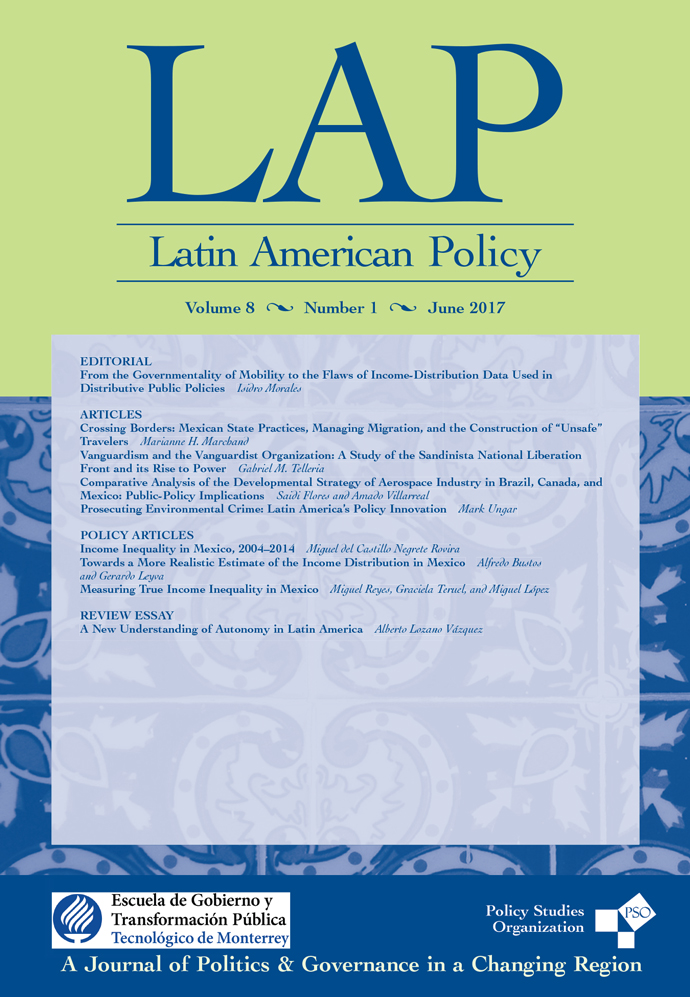Crossing Borders: Mexican State Practices, Managing Migration, and the Construction of “Unsafe” Travelers
Abstract
enThis article focuses on Mexican state practices dealing with immigration. It analyzes how the Mexican state has generated new governmentalities toward border crossings, thereby creating new (securitized) subjectivities, and to what extent such governmentalities have been the result of unequal relations with its northern neighbors versus a response to more locally driven needs. It focuses particularly on the changes since 9/11 and the Calderón Government's War on Organized Crime, both of which have engendered new dynamics in North American relations, bringing out the tensions and contradictions about security concerns; mobility of goods, services and people; and free-trade-driven regionalism. The ensuing regional focus on security and regulating the mobility of travelers, categorizing them into safe and potentially “unsafe” subjects, and migrants who are being “managed” through temporary worker programs have turned Mexico into a buffer state protecting regional North American interests. Despite its role as a buffer, the Mexican state is also “performing” its own sovereignty and following its priorities and needs, which do not necessarily coincide with those of its northern neighbor. This article analyzes these tensions in Mexico between being a buffer state and articulating its own priorities, particularly against the background of the War on Terror initiated by the United States, the War on Organized Crime, and the continuing economic crisis of 2009. The Mexican state has undergone significant modernization in terms of its border-control capacities, thus enhancing its capacity as a buffer state while enhancing its performative sovereignty. Second, the paper analyzes how these transformations have affected the mobility of “ordinary” travelers and migrants.
Abstract
esEste artículo se enfoca en las prácticas del Estado mexicano en materia migratoria. Analiza cómo el Estado mexicano ha generado nuevas gubernamentalidades de los cruces fronterizos, creando nuevas subjetividades (“securitizadas”), y la manera en que estas gubernamentalidades fueron el resultado de las relaciones desiguales de México con su vecino del norte, o más bien una respuesta a necesidades locales. El artículo se enfoca en particular en los cambios después del 11/9 y la Guerra contra el Crimen Organizado emprendida por el gobierno de Felipe Calderón. Ambos eventos han generado nuevas dinámicas en las relaciones norteamericanas, evidenciando las tensiones entre la seguridad, la movilidad de bienes, servicios y personas, y el regionalismo articulado en torno al libre comercio. El enfoque regional de la seguridad y la regulación de la movilidad de los viajeros, categorizándolos en sujetos “seguros” y “potencialmente inseguros”, así como de los migrantes cuya movilidad es gestionada por medio de programas de trabajadores temporales, han convertido a México en un estado amortiguador y protector de los intereses norteamericanos. A pesar de su papel de amortiguador, el Estado Mexicano también ha generado una “performatividad” de su soberanía, siguiendo sus propias prioridades y necesidades que no necesariamente coinciden con los del vecino del norte. Este artículo analiza dichas tensiones entre fungir como un Estado “amortiguador” y articular sus propias prioridades, particularmente en el contexto de la Guerra contra el Terror iniciada por los EE.UU., la Guerra contra el Crimen Organizado y los efectos de la crisis económica de 2009. El Estado Mexicano ha pasado por una modernización significativa de sus capacidades de control fronterizo, fortaleciendo su capacidad como Estado amortiguador a la par de intensificar su soberanía performativa. En segundo lugar, el artículo analiza cómo estas transformaciones han afectado la movilidad tanto de los viajeros “ordinarios” como de los migrantes.
Abstract
zh本文聚焦于墨西哥处理移民问题的国家实践, 分析了该国如何在边境口岸发展治理术, 并由此建立新的(安全化的)主体。同时分析了这类治理术在何种程度上成为了”北部邻国不平等关系和墨西哥自身需求”产生的结果。本文特别研究了自911事件和卡尔德龙政府对有组织犯罪实施打击以来发生的变化。这两次事件都给北美关系带来了新动力, 揭示了安全(顾虑)、商品流动性、服务和人民, 以及自由贸易驱动的区域主义之间存在的紧张性和矛盾。随后的区域安全重点、管理游客流动、区分安全游客和潜在”不安全”游客, 以及通过临时劳工计划进入墨西哥的移民已将墨西哥变为保护北美区域利益的缓冲国。尽管作为缓冲国, 墨西哥依然”展示”了其主权, 遵循其优先事项和需求, 这一点和美国的相关需求并不一致。本文分析了墨西哥作为缓冲国和阐明自身优先权之间存在的紧张性, 特别是在其打击由美国发起的恐怖活动, 打击有组织犯罪, 以及从2009年持续到现在的经济危机这些背景下。墨西哥在边界管制能力上已经历了显著现代化过程, 由此在提高主权行使的同时还增强了其作为缓冲国的能力。本文还研究了这些转变如何对”普通”游客和移民的流动性造成了影响。




